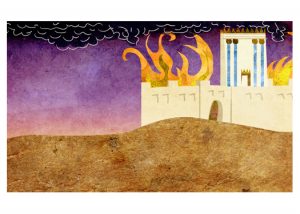Darkness, sadness, and a seemingly unending journey through painful events recounting death, destruction, and doom. Watching the evening news or browsing your phone’s news feed too often feel just like that. Catastrophe is fast becoming the daily grind.
It goes without saying that we cannot let ourselves become desensitized, let alone immune or complacent. Today’s date on the Jewish calendar is a strong reminder how and why. Today is Tisha B’Av, the ninth day of the Hebrew month of Av, on which both the First Temple and the Second Temple were destroyed, and with them the Jewish people’s direct religious connection to God.
 Tisha B’Av also marks infamous moments in Jewish history of persecution, destruction, and more. From the Crusades and the Inquisition to pogroms and expulsions, Jews have found one day on which to center many (but certainly not all) of the catastrophes to befell us. That centering is the key to the Jewish avoidance of malaise, ennui, and worse.
Tisha B’Av also marks infamous moments in Jewish history of persecution, destruction, and more. From the Crusades and the Inquisition to pogroms and expulsions, Jews have found one day on which to center many (but certainly not all) of the catastrophes to befell us. That centering is the key to the Jewish avoidance of malaise, ennui, and worse.
Tisha B’Av, for all its commemoration of the past, also compels us to look forward. Jews consistently say “never again” not only about the Holocaust but also events that remind us of how we experienced those awful events in our history. We say “never again” so that no people should suffer similarly. Tisha B’Av is our annual reminder to complete that journey from past to future.
The first sentence of this reflection is not really about witnessing today’s news; it is a poignant description of what I experienced as a counselor at Jewish summer camp at the nighttime start of Tisha B’Av. I literally walked my campers along a path of exhibits of past events remembered on Tisha B’Av before we then sat in the dark on the tennis courts to chant the Book of Lamentations and to sing dirges that move me every time I hear even just a bar of the melodies.
Tisha B’Av works because we acknowledge seriously, deeply, and emotionally what it means to live in a world where loss, destruction, and desolation are real. It works, too, because we spend the next day slowly standing up. We wait until the afternoon to don our tefillin, the ritual phylacteries that symbolize a crown. We fast all day. Come the end of Tisha B’Av, we focus on the rebuilding, renewal, and re-engagement; we also eat again.
It is too much to feel those emotions and to try to rebound or recover from depressing depths of reality on a regular basis; humans were not built for that. Tisha B’Av encourages us to annualize our transition from grief to resolution and, not incidentally, to make that transition in community. We need each other to make it through; humans are built for that.
If the world seems too much to bear, it probably should. Tisha B’Av does not say “never again” to catastrophe; it implies strongly that it will happen again. Tisha B’Av, though, does say next time let us work together to call it what it is, to mourn, and to mobilize. Let us be the light.
About Rabbi Jeremy Winaker
Rabbi Jeremy Winaker is the executive director of the Greater Philadelphia Hillel Network, responsible for West Chester University, Haverford, Bryn Mawr, and other area colleges. He is the former head of school at the Albert Einstein Academy in Wilmington and was the senior Jewish educator at the Kristol Hillel Center at the University of Delaware for four years. Rabbi Winaker lives in Delaware with his wife and three children.


Comments